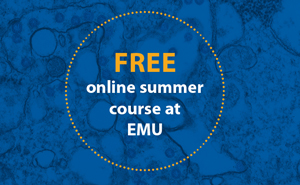LARTS 190: Imagining the Future after COVID-19
Free 1 SH online summer course at EMU
 Who: Incoming first-year EMU students, current EMU students, and community members
Who: Incoming first-year EMU students, current EMU students, and community members
What: 1 semester hour course learning about COVID-19, its effects, and what we can do to
make a better world after the pandemic
Where: Online, live-sessions plus some asynchronous prep and reflection the rest of the week.
When: Tuesday evenings June 30 - August 11, 2020
Cost: FREE ($415 value)
Registration is now closed
To try to imagine a future after COVID-19 is to acknowledge that we’re not there yet, that all of us—whether we catch the virus or not—are still affected by this pandemic. Moreover, none of us are affected in quite the same way. Each of us experiences this pandemic differently, and part of the work of this class will be to better understand those differences among us and our responsibility to one another when this pandemic is finally over.
While COVID-19 is changing the world for the worse, some things also seem to be changing for the better and in ways that we might never have thought possible before the pandemic. The aim of this course is to try to discern that better, emerging future through a collaborative, multidisciplinary, critical analysis of the COVID-19 pandemic.
If you have questions about the course, feel free to reach out to one of the course co-leaders: Kevin Seidel, Associate Professor of English (kevin.seidel@emu.edu) or Laurie Yoder, Assistant Professor of Chemistry (laurie.yoder@emu.edu).
Schedule
Week 1 | June 30, Tuesday, 6:30–8:30pm
Treating COVID-19
What do we know about the biology of COVID-19? What’s next in vaccine development?
What public health measures are working to slow the spread of COVID-19?
Kristopher Schmidt, Associate Professor of Biology
Kate Clark, Assistant Professor of Nursing
Week 2 | July 7, Tuesday, 6:30–8:30pm
Pandemic History and Data
What can we learn from past pandemics about life after this one? What can we learn
from visual presentations of data about the pandemic?
Mary Sprunger, Professor of History
Daniel Showalter, Associate Professor of Mathematics
Week 3 | July 14, Tuesday, 6:30–8:30pm
Politics and Collective Trauma
Why has the U.S. response to COVID-19 been so contentious and uneven? What is collective
trauma and what might it have to do with that response?
Mark Metzler Sawin, Professor of History
Ryan Thompson, Assistant Professor of Psychology
Trina Trotter Nussbaum, Associate Director, Center for Interfaith Engagement
Week 4 | July 21, Tuesday, 6:30–8:30pm
Zoonotic Viruses, Wet Markets, and the Economics of COVID-19
Where do coronaviruses come from? What are the links between environmental degradation
and pandemics? What does COVID-19 have to teach us about how our economy is connected
to the natural world? What are the economic impacts from a pandemic?
Jim Yoder, Professor of Biology
Jim Leaman, Associate Professor of Business and Leadership
Week 5 | July 28, Tuesday, 6:30–8:30pm
Our Life with Animals, Our Life with God
Why are so many people taking refuge in nature during the pandemic? Why is that refuge
harder to come by for some people? What do the scriptures say about how our life with
God is related to our life with animals?
Steven Johnson, Professor of Visual and Communication Arts
Andrea Saner, Associate Professor of Old Testament
Week 6 | August 4, Tuesday, 6:30–8:30pm
Systemic Racism in the U.S. before and after COVID-19
Why has COVID-19 hit African-Americans harder than other groups? Why does rural Navajo
Nation have the highest infection rates in the country?
Jenni Holsinger, Associate Professor of Sociology
Matt Tibbles, Teaching Fellow, Applied Social Sciences
Jim Yoder, Professor of Biology
Week 7 | August 11, Tuesday, 6:30–8:30pm
Resilience, Repair, and Transformation after COVID-19
How do we carry forward what we’ve learned about COVID-19, trauma, and restorative
justice?
Johonna Turner, Assistant Professor of Restorative Justice and Peacebuilding
Katie Mansfield, Lead Trainer, Strategies for Trauma Awareness and Resilience (STAR)
Weekly Schedule
The class is designed primarily to provide a forum for EMU students to learn about COVID-19, connect with one another in small groups, and hear from staff and faculty across campus. The presentation portion of the class is also open to any interested EMU faculty, staff, administrator, or alumnus and to any interested community member who registers above.
Here’s what a typical week looks like for the class:
Friday through Tuesday: Getting ready for class
Students and small-group leaders read and/or watch prep material for the upcoming class session
Tuesday evening: Class in session
6:30-6:40 Class opening
6:40-7:20 Presentations
7:20-7:40 Q and A with presenters
7:40-7:45 Transition to small-group discussions
7:45-8:20 Small-group discussions (for EMU students, led by EMU students)
8:20-8:30 Regathering and conclusion
Wednesday through Friday: Working on forum posts
Forum posts due Friday evening by 5:00PM


